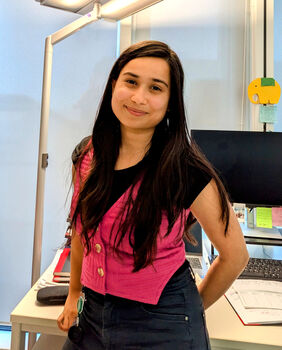Jena. Researchers at the Leibniz Institute on Aging – Fritz Lipmann Institute (FLI) in Jena have once again succeeded in securing highly competitive funding from the Federal Ministry of Research, Technology, and Space (BMFTR). Through the GO-Bio initial program, Dr. rer. nat. Prerana Chaudhari, postdoctoral researcher in the research group of Dr. Maria Ermolaeva, has been awarded €100,000 to advance the translational project SEAL (Strengthening Endothelial Adherence and Leakage Prevention).
The GO-Bio initial funding program supports life science research approaches with clear innovation potential at an early stage of development as a first critical step on the path to commercialization and improved health outcomes.
Leaky gut syndrome is a pathological weakening of the intestinal barrier that contributes to chronic inflammation, drives multiple aging hallmarks, and is implicated in a variety of widespread diseases, including inflammatory bowel disease (IBD), and metabolic disorders. “Despite the wide prevalence of leaky gut syndrome, current therapies are purely symptomatic, not causal. This indicates that there is no approved pharmacological solution to directly target and restore intestinal barrier function”, Dr. Chaudhari explains.
The SEAL project aims to change this by developing the first drug candidate to specifically treat leaky gut syndrome. Building on fundamental discoveries inspired from microbiome research, the team is exploring novel strategies to strengthen intestinal integrity by engaging key biological pathways.
“Our approach is to transform a basic microbiome discovery into a therapeutic solution with real patient benefit,” explains Dr. Chaudhari. “With SEAL, we hope to lay the foundation for a first-in-class treatment that addresses leaky gut at its root cause rather than only alleviating symptoms.” Dr. Ermolaeva adds: “This project exemplifies how insights from aging research can directly translate into innovative therapies for common diseases”.
The SEAL project is supported by the FLI’s internal SPARK mentorship program, which fosters translation of promising scientific discoveries into practical applications. With the GO-Bio initial funding, the team, together with Dr. Sonja Schaetzlein will refine its intellectual property strategy, conduct market and regulatory analyses, and establish a translational development plan, paving the way for follow-up funding and eventual commercialization.
The GO-Bio Initial program of the Federal Ministry of Research, Technology, and Space (BMFTR, formerly BMBF) is a two-stage funding measure in the life sciences sector, that supports early-stage ideas in the field of biosciences and provides up to €1.1 million annually for the exploration and feasibility phase. The declared goal is to bring these ideas to fruition.
Contact
Christel Werner
Press & Public Relations
Phone: 03641-656374, Email: presse@~@leibniz-fli.de









